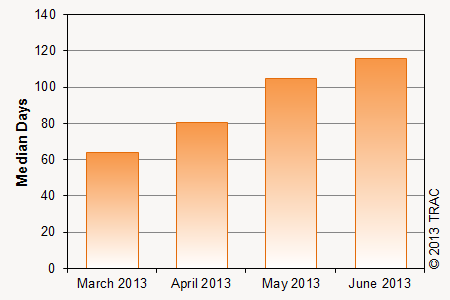Poor ICE FOIA Management Hinders Public Access to Immigration Records
Syracuse, NY — The Freedom of Information Office within Immigration and Customs Enforcement (ICE) continues to fall further behind in its processing of FOIA requests, according to the latest ICE records compiled and analyzed by the Transactional Records Access Clearinghouse (TRAC) at Syracuse University. The data further indicates that ICE is giving inadequate attention to the processing of the older requests for government documents stalled in its growing backlog.
Unanswered FOIA Requests
The backlog[1] of unanswered FOIA requests for ICE immigration records has climbed to 6,699 — up from only 2,903 when ICE last published its official backlog figures (as of September 30, 2012). At the end of June 2013, half of these 6,699 unanswered FOIA requests had been waiting 116 calendar days or longer. This is almost double the median wait time of 64 days at the end of March (see Figure 1). Further, ICE’s oldest request has now been waiting unanswered for 707 calendar days.
Figure 1. Time Waiting for Unanswered FOIA Requests in ICE Backlog
Ever since President Obama was elected more than four years ago, he and top members of his government have repeatedly proclaimed their belief in greater transparency and improving the operation of the FOIA.
From the perspective of the requestor — when measured by the date of the request rather than the date that ICE recorded the request as “received” — the wait times were even longer than they appear in Figure 1. Half of all unanswered FOIA requests have been waiting 395 calendar days or longer, when calculated from the date of the request. Much of this difference is due to the fact that ICE receives more than four out of every five (82%) of its requests as referrals from other agencies — particularly from the U.S. Citizenship and Immigration Services (CIS). With CIS referrals, for example, half or more have been waiting 458 calendar days or longer when calculated from the date of the request. Most of that time occurred before the letter was recorded as received by ICE, thus greatly adding to the delays experienced by the public in receiving requested immigration records. Two months ago, TRAC requested information — from FOIA offices at the Homeland Security Department headquarters as well as from CIS — that might help explain recent changes in the procedures by which requests for immigration records to CIS get referred to ICE, as well as the long delay this year before requests were referred to ICE. Despite telephone follow-up, no response to these queries has yet been received.
Even for the FOIA requests that were sent directly to ICE, half of all unanswered requests have been waiting 168 or more calendar days since the date of the requestor’s letter, based on agency records. According to ICE practice, the so-called “receipt date” is not the actual date when a request is received by the agency but when the request is first logged into the agency’s tracking system. While the log-in and receipt dates can be the same, sometimes processing is significantly delayed after the request first reaches ICE’s FOIA office. This occurs even on requests submitted through the FOIA office’s official email address, where the request and receipt dates should be identical.
Poor FOIA Management Practices
Certainly, ICE does not appear to have effective procedures in place for managing its growing caseload. Agency data show that if a request gets buried in the growing backlog, it is often forgotten while the agency focuses attention on more recent requests. TRAC identified all FOIA requests that had been received in a given month, and then computed on a month-by-month basis the proportion that remained unanswered. This analysis showed that older requests had higher odds of being unanswered than more recent ones. For example, one of four (27%) FOIA requests ICE received during March remained unanswered, while half (50%) of all requests received two months earlier during January still had not been answered.
Another important part of the management of ICE’s FOIA caseload is separating the requests grouped as “simple” from the shorter list of those classified as “complex.” By its name, the complex requests might be expected to take more time to process than the simple ones[2]. But consistent sorting of the incoming requests into the two processing tracks does not appear to be taking place. For example, for cases closed last month (June 2013) the median days for processing simple requests was 86 calendar days, while the time for complex requests was 71 calendar days — 15 days faster.
TRAC’s analysis of agency records indicates that similar requests are often placed in different queues depending upon who did the classification. Indeed, the ICE FOIA person who makes the assignment decisions can be more important than the nature or volume of the records sought. And reflecting the lack of consistent standards, the same inverse pattern — simple requests taking longer than complex ones — was also seen in the backlog of unanswered requests. The median or typical wait time for matters placed in the “complex” track is now 103 calendar days, while the median days for requests in the “simple” track is currently 119 calendar days.
TRAC shared these findings with ICE FOIA Officer Catrina Pavlik-Keenan in advance of publication and asked for comment. No response has been received as of this posting. More than a month ago we contacted both the ICE public affairs office as well as the FOIA Officer for comment on findings included in our May 30, 2013 report; no response was received to these earlier inquiries.

